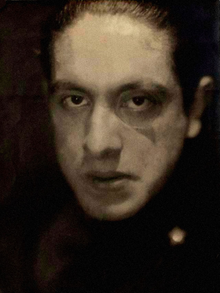Il Cammino del Cinabro
| Julius Evola | |
|---|---|

Evola during the 1920s
|
|
| Born |
Giulio Cesare Andrea Evola 19 May 1898 Rome, Italy |
| Died | 11 June 1974 (aged 76) Rome, Italy |
| Cause of death | Respiratory-hepatic problems |
| Nationality | Italian |
| Notable work |
Le Parole Obscure du Paysage Interieur (1920) Revolt Against the Modern World (1934) Synthesis of the Doctrine of Race (1941) |
| Website | www |
| Era | 20th century |
| Region | Western philosophy |
| School | Traditionalism |
| Institutions | School of Fascist Mysticism |
|
Main interests
|
History, religion, Western esotericism |
|
Notable ideas
|
Fascist mysticism, spiritual racism |
Baron Giulio Cesare Andrea Evola (Italian: [ˈɛːvola]; 19 May 1898 – 11 June 1974), better known as Julius Evola (/ˈdʒuljəs ɛˈvoʊlə/), was an Italian philosopher, painter, and esotericist. According to the scholar Franco Ferraresi, "Evola's thought can be considered one of the most radical and consistent anti-egalitarian, anti-liberal, anti-democratic, and anti-popular systems in the twentieth century. It is a singular (though not necessarily original) blend of several schools and traditions, including German idealism, Eastern doctrines, traditionalism, and the all-embracing Weltanschauung of the interwar Conservative revolutionary movement with which Evola had a deep personal involvement".
Evola is popular in fringe circles, largely because of his extreme metaphysical ideas (including belief in ghosts and telepathy) and his extreme traditionalism, nationalism, and misogyny. Many of Evola's theories and writings were centered on his idiosyncratic mysticism, occultism, and esoteric religious studies, and this aspect of his work has influenced occultists and esotericists. Evola also advocated rape (among other forms of male domination of women) because he saw it "as a natural expression of male desire". This misogynistic outlook stemmed from his extreme right views on gender roles, which demanded absolute submission from women.
...
Wikipedia
